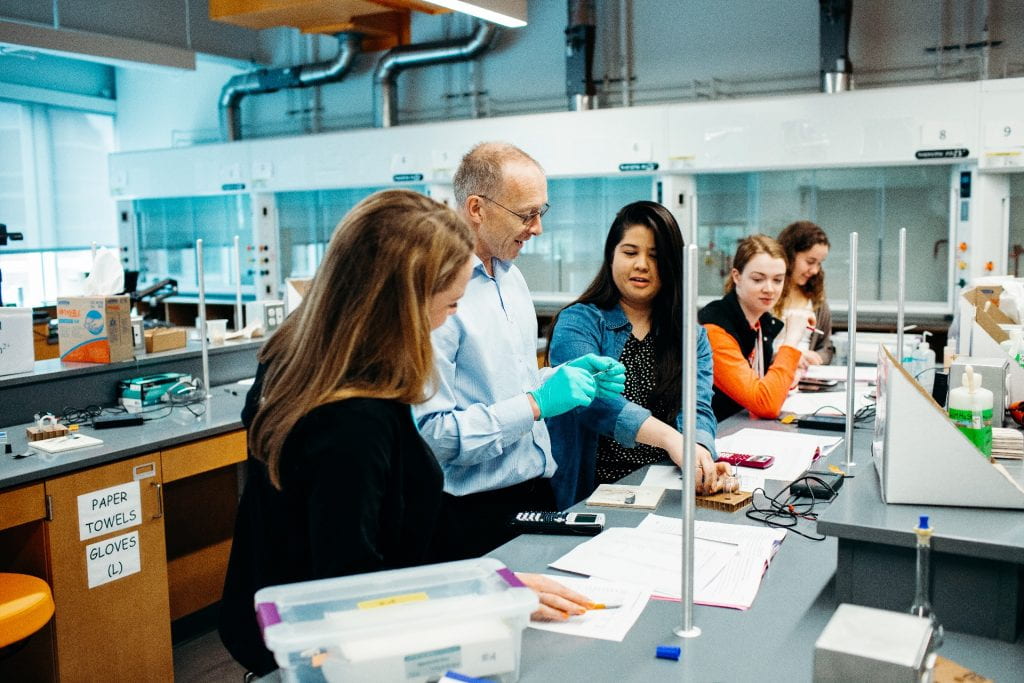Courses
The following courses are offered in our B.S. and B.A. degree programs. Additional electives are available on a yearly basis, as are general education courses for non-science majors.
CHM121 – Introductory Chemistry w/Lab
An introductory chemistry course covering topics such as periodic trends, descriptive chemistry of selected elements, atomic structure, thermodynamics, gas laws, equilibrium, molecular structure, chemical bonding, oxidation-reduction, acids and bases, and kinetics. Laboratory instruction stresses quantitative analysis. 1 semester, 4 credits.
CHM122 – Basic Inorganic Chemistry w/Lab
Covers topics such as periodic trends, descriptive chemistry of selected elements, atomic structure, thermodynamics, gas laws, equilibrium, molecular structure, chemical bonding, oxidation-reduction, acids and bases, and kinetics. Laboratory instruction stresses quantitative analysis. 1 semester, 4 credits.
CHM196 – Research
Second semester freshmen may elect to engage in an original laboratory or theoretical problem in chemistry or biochemistry in collaboration with a member of the faculty. 1 semester, 1 credit.
CHM221/222 – Organic Chemistry I/II w/Lab
A study of the compounds of carbon utilizing a problem-oriented approach both in lecture and laboratory that emphasizes the use of spectroscopic methods. 2 semesters, 4 credits each.
CHM295/296 – Research
Students in the sophomore year may elect to engage in an original laboratory or theoretical problem in chemistry or biochemistry in collaboration with a member of the faculty. 1 semester, 1 credit.
CHM309 – Biochemistry I
An overview of the biochemical reactions associated with living cells. Topics include protein structure/function relationships; enzyme structure, mechanism, and inhibition; carbohydrate and lipid structure. The biochemical reactions of the cell are surveyed, including glycolysis, Kreb’s cycle, electron transport, gluconeogenesis, and lipid and amino acid metabolism. 1 semester, 3 credits.
CHM310L – Biochemistry Laboratory
An integrated lecture/laboratory course designed to teach students fundamental laboratory techniques in biochemistry. Experiments include buffer preparation, assays for the detection of biological components, protein purification, SDS-PAGE, Western blotting, enzyme kinetics, DNA isolation, and PCR analysis. 1 semester, 3 credits.
CHM311 – Chemistry of Materials w/Lab
The objective is to understand the fundamentals of polymer and nanomaterial chemistry. Students will learn how to prepare and characterize various types of polymers and nanomaterial. Introduces some new spectroscopic techniques used to characterize these materials and study the physical properties that make them exciting to study in the world of materials chemistry. 1/2 semester, 2 credits.
CHM312 – Biochemistry II
A continuation of the concepts covered in CHM 309. A study of the various strategies of the control of metabolic pathways. Topics include cell signaling, transcription, translation, post-translational processing, regulation of gene expression, and vesicular traffic in the secretory and endocytic pathways. 1 semester, 3 credits.
CHM321 – Physical Chemistry
An examination of the equilibrium behavior of physical/chemical systems from the macroscopic and microscopic points of view. Thermodynamics with applications to phase and solution equilibria and reaction kinetics. 1 semester, 3 credits.
CHM321L – Physical Chemistry Laboratory
Laboratory course to accompany Chemistry 321.
CHM322 – Physical Chemistry II w/Lab
Physical chemistry is the rationalization of chemical phenomena through the application of physics to subatomic, atomic, molecular and particulate matter. Explores the field of quantum mechanics and quantum chemistry. Looks at how quantum theory has developed and is observed through spectroscopic techniques. 1/2 semester, 2 credits.
CHM331 – Advanced Analytical I w/Lab
The theory and practice of modern instrumental methods are presented. Emphasis is placed on the more important spectroscopic methods and chromatography, which are covered in depth. 1 semester, 4 credits.
CHM332 – Organic Analysis w/Lab
This lecture and laboratory course in organic synthesis and structural analysis will explore new techniques using reactions beyond the sophomore-level curriculum to prepare molecules with complex structures. Students will use advanced NMR spectroscopic techniques to elucidate the structures of these compounds. The ultimate goal is to develop problem-solving skills by identifying and characterizing novel organic molecules. 1/2 semester, 2 credits.
CHM381 – Chemistry Seminar
Students will attend all seminars by outside speakers and senior chemistry and biochemistry majors, will write meaningful and constructive critiques of the senior seminar presentations, and will attend and participate in class sessions aimed at identifying a suitable seminar topic. 1 semester, 1 credit.
CHM382 – Chemistry Seminar
In the junior year, students will construct and present three short developmental presentations leading to a final seminar on a topic from the field of chemistry that demonstrates an ability to read, interpret, and critique original research from the primary chemical literature. 1 semester, 2 credits.
CHM395/396 – Research
Students in the junior year may elect to engage in an original laboratory or theoretical problem in chemistry or biochemistry in collaboration with a member of the faculty. 1 semester, 3 credits.
CHM401 – Inorganic Chemistry w/Lab
Structure and bonding in inorganic systems are the general subjects of this course. Both main group and transition metal chemistry are discussed. 1 semester, 4 credits.
CHM432 – Advanced Analytical II w/Lab
This lecture and laboratory course is a continuation of Chemistry 331 exploring the theory and practice of modern instrumental methods. Emphasis is placed on atomic spectroscopy and electro-analytical methods. 1/2 semester, 2 credits
CHM481 – Chemistry Seminar
In the senior year, students will construct and present three short developmental presentations leading to a final seminar on a topic from the field of chemistry- often an area related to their own research- that demonstrates an ability to read, interpret, and critique research from the primary chemical literature. 1 semester, 2 credits.
CHM482 – Chemistry Seminar
Students will attend all seminars by outside speakers and junior chemistry and biochemistry majors. 1 semester, 0 credits.
CHM495/496 – Research
Students in the senior year may elect to engage in an original laboratory or theoretical problem in chemistry or biochemistry in collaboration with a member of the faculty. 1 semester, 3 credits.
Department of Chemistry and Biochemistry
Science Complex 104
(401) 865-2379
chemistry@providence.edu






